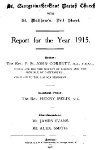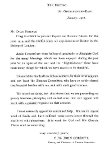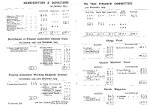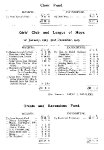

Confidential report presented by the Rector to
the Bishop of Stepney,
January 1914, & published accounts for the parish,
1915
Agencies
at work in the Parish
Weekdays: Matins & Evensong 10 & 8 daily
Sunday
Schools 10am & 3pm |
Sick
and General Visiting
A Register of the Sick is kept. A Meeting of Clergy and Workers is held at the Rectory every Monday morning when the Sick List is gone through, matters of parochial business are discussed, and the work for the week arranged. The Lay Reader and Lady Workers visit the people continuously and systematically. The Rector visits all sick cases and does as much general visiting as he can. There is also a Mission Woman and Parish Nurse, District Visitors & Magazine Distributors.
Jewish Work There is a Lay Reader for special work amongst Jews. He holds 1. A Mothers' Meeting 2. An Enquiry Class for Men 3. A Sunday School.
A Church Army Home in the Parish. The Men come to St George's. Miss Stears' Rescue Home in the Parish. The Girls come to St George's. |
Table
of Communicants, 1903-1912
|
N.B. The above figures are less discouraging than those I was led to expect by my predecessor Mr. Harris, who frankly warned me that the numbers were going down. The average attendance of those who have been Confirmed in recent years is higher than that of the larger numbers in days gone by. This is a step in the right direction. |
The population is largely Jewish. Christian families migrate and Jews take their places. Consequently, the number of Communicants and of general worshippers diminishes year by year.
My predecessor, Mr. Harris, warned me of this, and drew a very gloomy picture of it. In ten years I have not found the diminution nearly as bad as he led me to fear.
The Parish is under-staffed as regards Clergy. When I came there were three Curates. The E.L.C.F. gave a Grant of £50 for the third. As there was no Curates' Fund I found I had to pay, largely out of my own Stipend, £400 for Curates' Stipends. Other parochial claims on my stipend increased this to £600 in the first year with the result that my banking account became so much overdrawn that the Bank refused to cash any more cheques. I was obliged to reduce the staff to two Curates, and eventually to one. I cannot afford to pay the stipends of two, and I have no Grant.
Mr. Harris had warned me of the financial difficulties also. He told me that he had considerable private means, but even so he could not make ends meet. I have no private means.
The parish requires two Curates. There is not enough work for three.
We are doing Pioneer Work in some directions, and this has the effect of lessening our numbers, though it leaves us with clearer results. For instance,
1. We are trying the effect of doing away with Prizes and Treats in our Sunday School. The immediate effect of this has been a falling off in the attendance. Children, encouraged by their parents, go to other Sunday Schools were they get more so-called 'encouragement'.
2. We follow out the Rules of the Prayer Book with regard to the administration of Holy Baptism, and insist on the necessary Sponsors [see here for the Guild of Sponsors]. This has been objected to by parents who prefer to go to neighbouring Churches where “they don't ask no questions nor make no fuss.”
3. We have small numbers to present for Confirmation, because we do not force it on young people who are not fit to receive it, and even reject some whom we feel we should not present.
In former years inducements were held out to Candidates, such as Dresses for married women. Some have been heard to say they “went for the Dresses”, and one candidate got drunk on the way home. We are very careful. Some of our Children attend St Paul's, Dock Street, Church Day School. We are thankful for the good Church teaching they receive there, but a condition is imposed by the Vicar that they must be confirmed at St Paul's. This also lessens our numbers.
If the older children are not confirmed at St Paul's the Vicar won't take the younger ones. (Hearsay.)
Competition amongst the Parishes is very keen in this district. The Jews are rapidly taking possession and the Clergy are fighting desperately for the few Christians that are left.
As a consequence of the fact that we do not hold out any bribes, there are a considerable number of parishioners who go to other Churches, where, as they say themselves, “there is something to be had for going”. They also go because of the aforementioned laxity in the matter of Baptism.
The conditions of the parish are not normal and therefore success or failure cannot be measured by ordinary standards. Old people die, leaving gaps in our congregation, young people get married and go away, the children of the new generation are born away from the parish. Jews takes the places of all who leave, and there is no new influx of Christians.
The Parishioners are continually visited by a devoted band of Lay Workers, including a Scripture Reader, two Lady Workers and a Mission Woman. But they work year after year amongst the same people, in diminishing numbers.
The Rector is continually asked why the Bishop of the Diocese does not come to visit the parish. The Rector quite understands the difficulty, having invited the Bishop several times and had the difficulty explained. But the people cannot quite see it, and the fact remains that in ten years it has been impossible to get him to come, except for two Confirmations, which parishioners do not count as pastoral visits. It is now six years since he came.
Perhaps the gravest hindrance of all consists in the way in which the Rector's time and energies are wasted by the continuous financial strain. The expenses of the Parish – necessary for the continuance of the work – have always amounted to from £1,200 to £1,500 a year. A great deal of this has to be raised by means which make great inroads upon the Rector's time. During the ten years he has organzed many Bazaars and Sales of Work, three theatrical performances in West End Theatres, countless Concerts &c &c, and written innumerable begging letters. All this keeps him from doing the work for which he was ordained, and which he longs to be allowed to do.
The establishment
of a Finance Committee has greatly lessened the Rector's burden in this
respect. Instead of bearing the financial strain unaided he now has a
Committee of thirty representative members of the congregation, with an
average attendance of twenty at each meeting. The Committee in the
first year doubled, and in the second year trebled, the proceeds of the
annual Sale of Work. But the Rector is still responsible for the
raising of about £600 a year.
|
Income of Benefice
|
Additional Offices Vice
Chairman of Raine's School Governors |
The Bishop said -









Back to History page